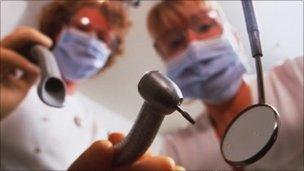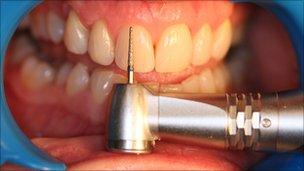Device 'cancels out the sound of the dentist's drill'
- Published

Some people find the sound of a dentist's drill distressing
An invention which cancels out the noise of a dentist's drill could help people overcome their fear of a check-up, researchers say.
For many, the sound of the drill is a big cause of anxiety when it comes to visiting the dentist.
This new device allows patients to listen to music on an MP3 player, while the sound of the drill is blanked out.
Patients are, though, still able to hear the dentist's voice because not all sounds are filtered out.
The device is similar to noise cancelling headphones.
It works by turning the sounds of the dental consulting room into a digital signal.
A special chip called a digital signal processor analyses the incoming sound from microphones placed close to the dental drill.
It produces an inverted sound wave to cancel out unwanted noise in the headphone signal.
It also uses "adaptive filtering" technology, where electronic filters lock onto sound waves and remove them, even if the wave's amplitude and frequency change as the drill is being used.
But this also allows other noises like the dentist's voice to come though.
So a patient could simply plug the device into their MP3 player and then, via their headphones, listen to their own music without being disturbed by the noise of the drill but still be able to hear the dentist.
'No extra cost'
Developed by experts at King's College London, Brunel University and London South Bank University, it was originally the idea of Professor Brian Millar of King's Dental Institute.
He was inspired initially by the efforts of car-maker Lotus who were trying to develop a system that removed unpleasant road noise, while still allowing drivers to hear emergency sirens.
After more than 10 years of research and collaboration with engineers, Professor Millar and his team have developed a prototype.
"Many people are put off going to the dentist because of anxiety associated with the noise of the dentist's drill, but this device has the potential to make fear of the drill a thing of the past.
"The beauty of this gadget is that it would be fairly cost-effective for dentists to buy, and any patient with an MP3 player would be able to benefit from it, at no extra cost."
Dr Mark Atherton of Brunel University's School of Engineering and Design said allowing the patient to still hear the dentist was a key theme throughout the project.

The new device could alleviate fear for patients
"You can't switch the patient off. They want to have a conversation with the dentist, so they can't just put a pair of ear-muffs on, they still want to hear a voice."
But Dr Atherton said the designers found that just reducing the noise of the drill, by putting on ear defenders for example, was not enough.
"The dental drill noise is so distinctive the brain still recognises it and people still hear it, such is the anxiety.
"It's such a distinctive sound, the pitch is probably recognised around the globe. Most people have heard it and, sadly for some, they dread it."
The team are now looking for investors to make the device commercially available.
Professor Millar said it has the potential to help people overcome their fear.
"What we need now is an investor to develop the product further, to enable us to bring this device to as many dental surgeries as possible, and help people whose fear of visiting the dentist stops them from seeking the oral healthcare they need."
- Published16 December 2010
- Published17 July 2010
- Published5 October 2010